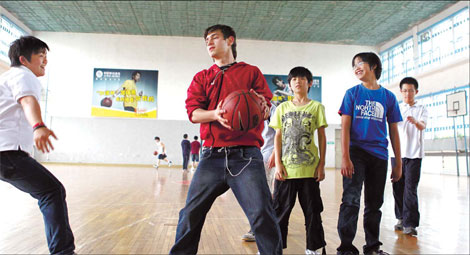The number of students from overseas being accepted by universities in Beijing is growing.
While local students anxiously wait for the results of the national university entrance examination, Zhang Guohui is relaxing and looking forward to an academic life at a prestigious university in Beijing.
|

International students play basketball at No 55 Middle School. (Photo: China Daily)
|
The 23-year-old Canadian-born Chinese has received an offer from Renmin University of China (RUC) after taking the university entrance exam for international students, on April 25.
Zhang, who previously ran the family business in Ontario, Canada, was swept off his feet by Beijing's glamour when he arrived here in February and decided to stay, even at the expense of studying for nine hours every day for the exam.
"My day normally started with me reading textbooks. I wouldn't stop until my brain couldn't take one more Chinese word," he said.
"I never studied like that back home. "The classical Chinese writers always gave me a hard time but the more I studied, the more I liked them."
His efforts paid off when he was admitted to RUC's Chinese linguistic literature department.
Zhang is one of an increasing number of foreign students studying at universities in Beijing. In 2008, there were 60,000, but this is expected to jump to 80,000 this year, the Beijing education commission said.
The Ministry of Education has introduced the "studying in China scheme" to foster the quantity and quality of foreign students. It aims to accept 500,000 foreign students in China by the end of 2020, says the National Outline for Medium- and Long-Term Educational Reform.
About 600 international students participated in the exam for RUC last year, and there were 800 this year. About 300 were admitted, said Li Yiqun, deputy director of RUC international office.
"International students can bring diversity to our campus culture. They are an indispensable part of China's higher education," he said.
He said 80 percent of foreigners sitting the exam are from South Korea, followed by students from Europe and the US. There are about 10 Chinese-born foreigners every year.
Li said among the 81 universities eligible to accept international students in Beijing, only Peking, Tsinghua and Renmin universities select students through the written test and interviews.
The other universities accept students on the basis of interviews only, or documents provided by the students.
The top three universities set examination paper individually. Chinese, English, Chinese history and geography are the common subjects, with mathematics included for science courses. "The level of Chinese is the subject we focus on the most," Li said. "Even if a student doesn't perform very well in the English exam but excels in Chinese, we will consider enrolling him or her."
Multiple choice, true and false questions and short answers are the three types of questions frequently used, Li said.
He cited a few questions from past exams: How many ethnic minorities does China have? Write a brief introduction to China's opening up policy. Write an invitation letter.
He said that more than half of the students sitting the entrance exam finished senior high school at the international departments of public middle schools in Beijing.
Many want to continue tertiary studies in China because they want to engage in trade and business between China and their home countries.
In Beijing, 97 primary and middle schools are allowed to receive international students, which enrolled 6,773 students by the end of last year, Beijing's commission of education said.
From 2005 to last year, 78 out of 200 students, some from the international department of the high school affiliated to RUC, undertook the exam; 53 were admitted by Peking and Tsinghua universities, 13 joined RUC, the website of the school said.
The international department of No 55 Middle School has about 20 students who will sit for the exam next year. The school also runs an extra class to help students prepare for the exam.
"Every year, we have students who are admitted to the best universities in China such as Peking and Tsinghua universities," Wang Jing, director of the department said.
However, not everyone is happy with the foreign student university entrance exam system, questioning its equality and fairness.
Liang Nan, a third-year senior high student at Beijing Yuyuantan Middle School, said she has been studying tirelessly for the past three years, hoping to study at the University of International Business and Economics.
"But these foreign students, who only take a few Chinese training courses, can receive offers for prestigious universities in Beijing," she said. "It is not fair."
Chu Zhaoyang, a research fellow at the China National Institute for Educational Research, said the minimum standard for foreigners to apply for schools in Beijing is low.
"Only if the education quality is improved will more and better students come to Beijing," he said.
(China Daily June 17, 2010)